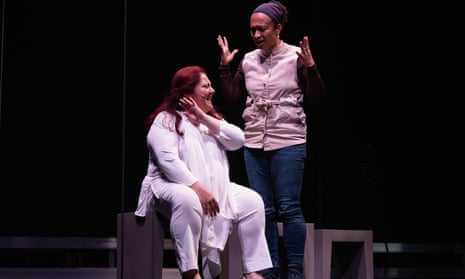Bushra El-Turk’s multimedia opera Woman at Point Zero is an angry yet restrained distillation of the 1975 novel of the same name by the Egyptian feminist and activist Nawal El Saadawi. Extracts from the opera, then a work in progress, were performed during the 2017 Shubbak festival, though it was only heard complete in Aix-en-Provence last year, and now it comes to London after performances in Belgium and Luxembourg. (LOD music theatre, based in Ghent, are the co-producers.) The creative team, meanwhile, are all women, and this Linbury run forms the centrepiece of this year’s Engender festival, focusing on new work by female and non-binary artists.
At the opera’s centre is an encounter between Fatma (Dima Orsho), a sex worker and activist jailed for killing an abusive pimp, and Sama (Carla Nahadi Babelegoto), a documentary film-maker interrogating the initially reluctant Fatma about her life. The tale the latter eventually tells, in which Sama sees a reflection of her own concerns, catalogues the brutalities of a patriarchal society that have fed both her desire for emancipation and the sense of individual freedom and integrity she now feels despite the confines of a prison. This all-important backstory is told with extraordinary rapidity in places, barely giving us, or indeed the characters, time for its implications to fully sink in. Hurtling momentum may have been the intention, but this feels rushed at times, and the opera’s dramatic power might have proved greater had El-Turk and librettist Stacy Hardy actually been more expansive in their treatment.
The east-west fusion score, however, is fascinating. The vocal writing for both women veers between speech, recitative, arioso and traditional Arabic song: Fatma has moments of fierce lyricism, while Sama’s role is more declamatory and reined in. The work was written in part for the excellent Ensemble Zar, who play a mixture of western classical and eastern instruments, and there are some wonderful sounds and textures as cello and Iranian kamancha perform sorrowfully beautiful duets, and a husky sounding taegum, a Korean alto flute, offsets the impertinent urbanity of an accordion.
Laila Soliman’s staging, meanwhile, is minimalist, but effective. Videos forcefully underscore Fatma’s narrative, while the men from Ensemble Zar sometimes abandon their instruments to yell obscenities at the women or form a threatening chorus of wolf-whistlers. The protagonists are both excellent: after a low-key start, Orsho achieves a fierce exaltation in her demands for autonomy; Babelegoto, a striking singer-actor is particularly fine, with a wonderfully warm tone, making every word tell. Both are amplified, and the sound balance took a few minutes to settle on opening night, though Kanako Abe conducted with considerable intensity.
